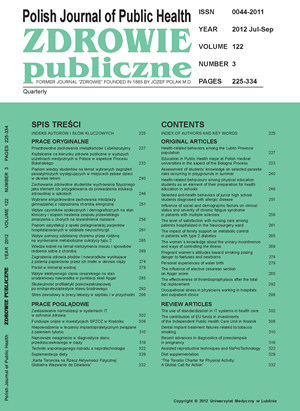Wpływ czynników społecznych i demograficznych na stan kliniczny i stopień nasilenia zespołu przewlekłego zmęczenia u chorych na stwardnienie rozsiane
DOI:
https://doi.org/10.12923/j.0044-2011/122/3/a.06Słowa kluczowe:
stwardnienie rozsiane, Zespół Przewlekłego Zmęczenia, Skala Bartel, Skala Becka, Skala Kurtzke’goAbstrakt
Cel. Celem pracy była ocena wpływu czynników społecznych i demograficznych na stan kliniczny i poziom zespołu przewlekłego zmęczenia u chorych z SM.
Materiał i metody. Grupę badaną stanowiło 33 pacjentów z rozpoznanym SM, leczonych w Oddziale Rehabilitacji i w Oddziale Neurologii z Pododdziałem Leczenia Udaru Mózgu w okresie od 20 listopada 2010 r. do 27 kwietnia 2011r. Do badań wykorzystano ankietę zawierającą dane społeczne i demograficzne oraz Skalę Barthel, Skalą Becka, Skalą Kurtzke’go i Skalą Ciężkości Zmęczenia. Wyniki zostały opracowanie statystycznie za pomocą statystyk opisowych i współczynnika korelacji rang Spearmana.
Wyniki. Stwierdzono istotne statystycznie korelacje między stanem funkcjonalnym ocenionym w skali Barthel a wiekiem badanych, czasem trwania choroby oraz wynikiem w Skali Kurtzke’go. Nie uzyskano żadnych istotnych statystycznie zależności między Skalą Becka a analizowanymi czynnikami. Natomiast uzyskano istotnie statystyczną korelację pomiędzy wynikami uzyskanymi w Skali Ciężkości Stopnia Zmęczenia a stanem rodzinnym w badanej grupie. Stwierdzono również słabą korelację między wynikami w Skali Barthel i w skali depresji Becka a wynikami w Skali Ciężkości Zmęczenia.
Wnioski. Wykazano istotnie statystyczną korelację pomiędzy wynikami w Skali Ciężkości Stopnia Zmęczenia a stanem rodzinnym, występującą depresją oraz możliwościami funkcjonalnymi w zakresie wykonywania czynności życia codziennego. Nie wykazano istotnie statystycznej korelacji między czynnikami takimi jak płeć, miejsce zamieszkania, wykształcenie, wiara, czas trwania choroby a występowaniem zespołu przewlekłego zmęczenia u chorych na SM.
Bibliografia
1. Dworzańska E, Mitosek-Szewczyk K, Stelmasiak Z. Zespół zmęczenia w stwardnieniu rozsianym. Neurologia i Neurochirurgia Polska. 2009:43(1):71-6.
2. Bałkowiec-Iskra E, Newada M. Zespół przewlekłego zmęczenia- postępy leczenia. Przew Lek. 2002;5(7):16-22.
3. Kurowski M, Kuna P. Zespół przewlekłego zmęczenia. Alergia Astma Immunologia. 1997;2(4):223-8.
4. Miller E. Kriostymulacja czynnikiem wspomagającym rehabilitację chorych na stwardnienie rozsiane z zespołem zmęczenia. Wiad Lek. 2010;LXIII(2):41-5.
5. Brola W, Ziomek M, Czernicki J. Zespół zmęczenia w przewlekłych chorobach neurologicznych. Neurologia i Neurochirurgia Polska. 2007;41(4):340-9.
6. Opara J. Klinimetria w stwardnieniu rozsianym. Farmakoter Psychiatr Neurol. 2005;3:219-26.
7. Krupp L, LaRocca N, Muir–Nash J, et al. The fatigue severity Scale: application to patients with multiple sclerosis and lapus erythematosis. Arch Neurol. 1989;46:1121-3.
8. Comi G, Leocani L, Rossi P, Colombo B. Physiopathology and treatment of fatigue in multiple sclerosis. J Neurol. 2001;248:174.
9. Flachenecker P, Kumpfel T, Kallmann B, et al. Fatigue in multiple sclerosis: a comparison of different rating scales and correlation to clinical parameters. Mult Scler. 2002;8:523.
10. Santon BR., Barnes F, Silber E. Sleep and fatigue in multiple sclerosis. Mult Scler. 2006;12:481-6.
11. Losy J. Zmęczenie w stwardnieniu rozsianym. Farmakoter Psychiatr Neurol. 2005;3:279-82.
12. Łabuz-Roszak B, Pierzchała K, Kumor K, et al. Ocena częstości występowania zespołu zmęczenia u chorych na stwardnienie rozsiane. Wiad Lek. 2009;LXII(2):99-103.


